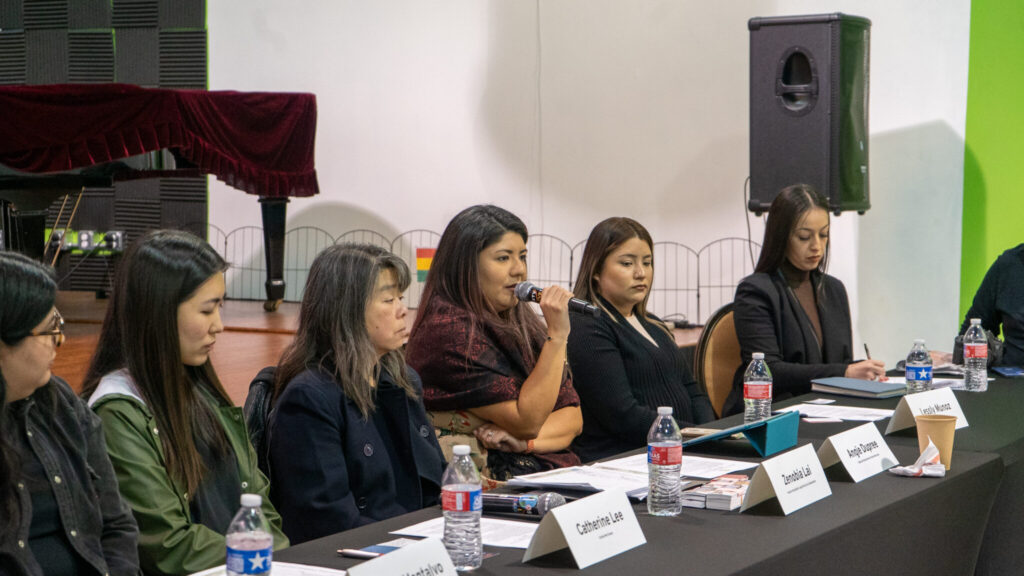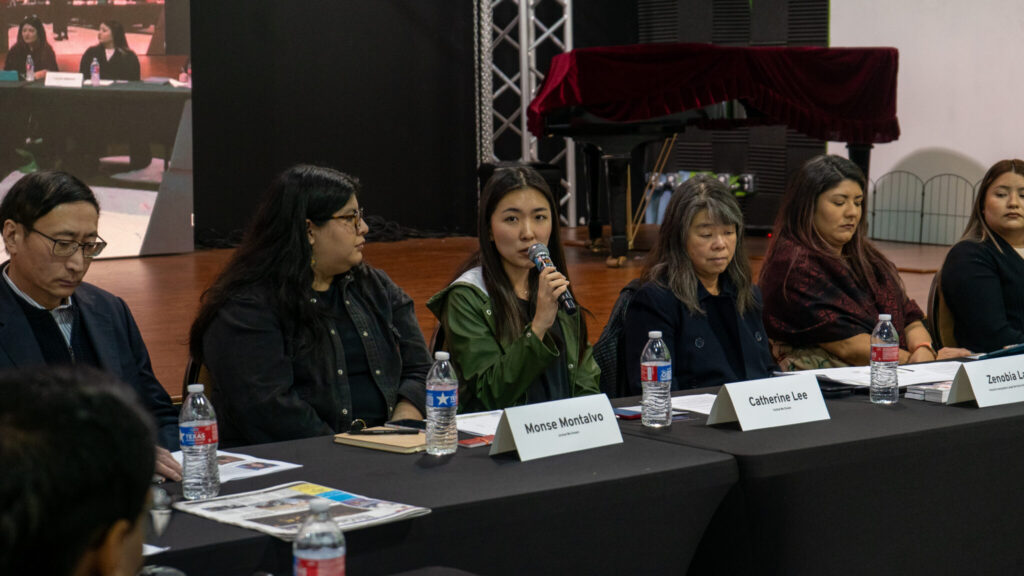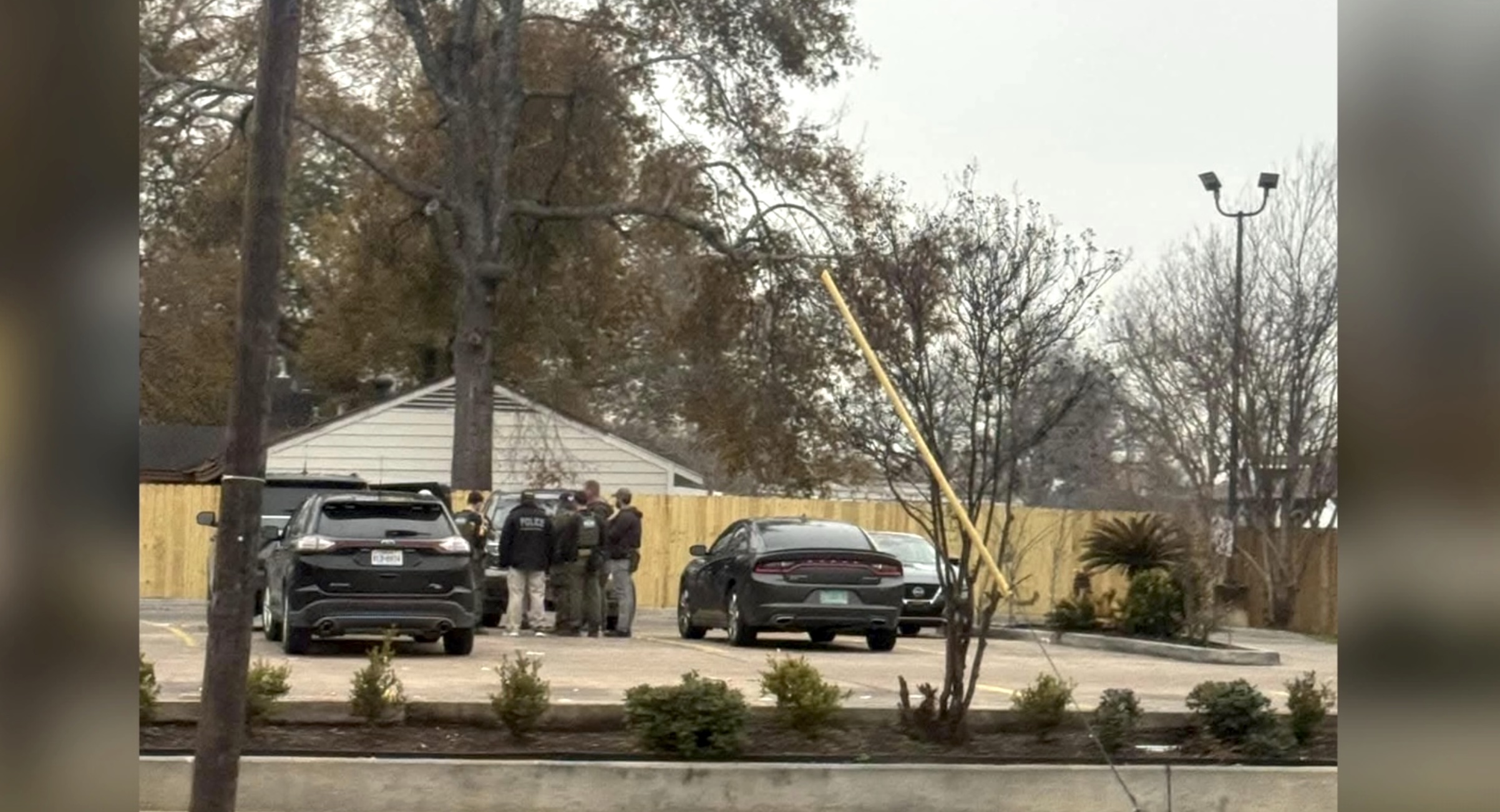By Nathaniel Greene | Bayou Beat News
HOUSTON – Social media was abuzz last week after what appeared to be Immigration and Customs Enforcement (ICE) activity at Timmy Chan’s, a fast-food restaurant in the city’s predominantly African American South Park neighborhood.
“ICE was at Timmy Chan’s on MLK, and Burger Park isn’t open for some reason,” one caption read, alongside a photo showing a heavy law enforcement presence outside the popular fried chicken spot.
The post quickly ignited mixed reactions ranging from dark humor—“2025 jump out boys” to casual indifference—“I’m going to mind my Black business,” and a dose of I told you so—“I’m sure they voted for him, and now they seeing how they got played.”
While it has not been confirmed whether the incident was an ICE raid, the rapid spread of social media posts makes one thing clear—Houston’s streets are on high alert.
This rising tension at the local level mirrors a broader national crisis, as fears over mass deportations and family separations escalate. Across the country, advocates, legal experts, and community leaders are stepping into political roundtables to help Americans understand “what’s going on.”
Local experts gathered on January 28 for a Houston Ethnic Media roundtable briefing to discuss the new administration’s intensified immigration enforcement strategies. The event provided crucial insight into the reality playing out in Houston neighborhoods and across Texas, where immigration crackdowns are disrupting daily life for countless families.
Texas a Testing Ground for Mass Deportation
Within hours of taking office, President Donald J. Trump declared an “invasion” and a national emergency at the U.S.-Mexico border, setting the stage for a dramatic escalation in immigration enforcement—and Texas is at the epicenter.
Kristin Etter, Director of Policy and Legal Services at the Texas Immigration Legal Council, detailed how Texas has served as a “model for the Trump prototype of mass deportation.” She emphasized that Operation Lone Star, launched by Governor Greg Abbott in 2021, laid the groundwork for these federal-level efforts.
“We have seen that throughout Operation Lone Star in its entirety,” Etter explained. “ declared a disaster… not on our hurricane or wildfires but on the ‘ongoing surge of individuals unlawfully crossing the Texas-Mexico border,’ essentially announcing an invasion. What that does is it frees up the executive to have an immediate power grab and provides a model to have state law enforcement and military carry out mass immigration enforcement with mass deportation.”
Etter also warned that Texas is now offering “over 1,400 acres for mass deportation facilities,” suggesting an impending expansion of large-scale detention operations.
Stripping Resources from Local Communities

Beyond enforcement, the Trump administration is using financial leverage to coerce compliance from local governments and nonprofits. Zenobia Lai, executive director of the Houston Immigration Legal Services Collaborative, underscored the devastating economic impact.
“The Trump administration is leveraging funding to force local governments and nonprofits to comply,” Lai stated. “Federal grants that support community services—such as refugee resettlement, health care, and education—are being threatened. Organizations like Catholic Charities and the YMCA could lose critical resources, affecting not just immigrants but entire communities.”
Lai cited a memo that reportedly instructed federal agencies to halt funding for immigrant support services. “The message is clear,” she said. “We are going to not only hurt the people, the immigrants, but we’re also going to make sure that the organizations that want to help immigrants would have no way to do that.”
DACA in Legal Limbo
DACA recipients remain particularly vulnerable under these new policies. Catherine Lee, National Communications Manager for United We Dream, explained the precarious situation facing nearly 600,000 young people.
“DACA was never stable,” Lee noted. “We’ve seen it come under attack through the court systems, and currently, the Fifth Circuit Court of Appeals has ruled DACA is unlawful within Texas and a couple of other states.”
Despite the ruling, renewals are still being processed. However, new applications remain frozen, leaving many young immigrants without a path forward.
“For now, anyone and everyone with DACA can renew their applications,” Lee confirmed, but uncertainty looms over the future of the program.
DACA’s instability is rooted in its foundation as an executive action rather than a law passed by Congress. It has been subject to ongoing legal challenges since its inception in 2012, and in 2017, the Trump administration attempted to terminate it entirely.
“DACA does not provide a permanent legal status or pathway to citizenship,” Lee added, “which has left recipients in a state of legal uncertainty for over a decade.”
On-the-Ground Organizing and Know-Your-Rights Efforts

Community organizers are working to inform and protect immigrants amid the crackdown. Monse Montalvo, a Texas Organizer for United We Dream, emphasized the importance of verified information.
“We work with a coalition here in Houston, and this whole past week we’ve been trying to verify any reports of ICE activity,” Montalvo said. “We’re urging people on social media to make sure they include timestamps, details about officers’ clothing, vehicles—because we are seeing unmarked vehicles—and to avoid spreading panic.”
Montalvo highlighted a crucial tool in the fight against unlawful enforcement actions: the “red card,” a resource that helps immigrants understand their rights during encounters with ICE.
“If police, FBI, Border Patrol, or ICE agents are knocking on the door, do not open it,” she stressed. “Ask for a warrant signed by a judge. ICE officers almost never have a warrant signed by a judge.”
The Urgency of Naturalization
While many fear deportation, some are looking toward naturalization as a long-term solution. Angie Dupree, Citizenship Coordinator at the National Partnership for New Americans, is leading efforts in Houston to assist legal permanent residents in becoming U.S. citizens.
“Houston has one of the highest numbers of eligible green card holders—approximately 300,000,” Dupree shared. “But many face barriers like high application fees and lack of legal resources.”
Naturalization not only provides security but also strengthens communities. “Citizenship means stability and opportunity,” Dupree said. “It means neighbors who are here to stay and are committed to building our shared community.”
Yet, for many, the cost remains prohibitive. “The application fee is $710,” Dupree noted. “That’s a lot for many families, but we’re working with organizations that offer financial assistance to help ease the burden.”
Moving Forward
What happens in Texas will possibly set the precedent for the rest of the country.
“We must not surrender our humanity,” Lai said. “Now, more than ever, we need to stand together.”
Resources
During the briefing, panelists emphasized several critical resources available to immigrants in need of legal aid, advocacy, and general assistance. These include:
- Red Cards: A resource to help immigrants understand their rights when encountering law enforcement. These are available in multiple languages, including English, Spanish, Vietnamese, Chinese, Haitian Creole, and Arabic.
- United We Dream: A national immigrant youth-led organization providing legal resources, advocacy support, and “Know Your Rights” training.
- Texas Immigration Law Council: Protects and promotes the rights of immigrants and refugees of all nationalities in Texas. Formed in 2023 Texas Immigration Law Council is a nonpartisan statewide 501(c)(3) organization.
- Houston Immigration Legal Services Collaborative: Offers legal assistance, citizenship programs, and emergency aid for immigrants facing deportation.
- Naturalize Now Houston: A campaign assisting legal permanent residents with the naturalization process, offering free citizenship classes and legal guidance.
- Bonding Against Adversity: Provides free immigration assistance, including DACA renewals, citizenship application help, and workshops on legal rights.
- Local Immigration Hotlines: Several immigrant advocacy groups in Houston operate hotlines for immediate legal help.




